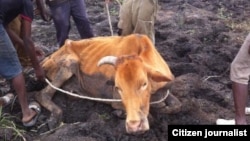Hungry villagers have started selling cattle for as little as $30 per beast to raise money to buy food following a dry spell that is threatening to cause havoc in most parts of Zimbabwe.
More than 5,000 cattle have allegedly succumbed to the drought in Masvingo province.
The villagers told Studio 7 they are losing their valued livestock at an alarming rate due to the current dry spell, which has turned grazing lands into dust bowls.
The hardest hit districts are Chiredzi, Mwenezi, Chivi and Bikita where villagers say they are losing up to four beasts per day.
One of the affected villagers, Elliot Mposhi of Bikita, said he was devastated after losing three of his cattle last month, leaving him without draught power.
Bikita said, “Cattle is our source of wealth and income as Africans and Zimbabweans in particular. We are losing a lot of cattle as the drought continues and we do not know how we are going to send children to school in the near future as we rely on the cattle for our livelihoods.”
In Mwenezi and Chiredzi, villagers have resorted to selling their cattle for as little as $30 in an effort to make money before the beasts succumb to the devastating drought.
Tigere Chauke of Chilonga in Chiredzi said they had no option but to make losses by selling the beasts at very low prices as under normal circumstances a cow costs between $300 to $600.
“Our cattle are dying. There is no grass any more, we are being forced to sell them for $30 to $50 although we bought them at high prices. It’s better to sell them at low prices than to lose them completely as we also need to fend for our families.”
Other villagers said they use their cattle for conducting various traditional practices like paying bride prices and bereavements and losing them will affect these norms.
Dereck Mutambu of Mhandamabwe of Chivi said villagers have since pleaded for government assistance but nothing has come by.
“Things are bad. Cattle are dying each and every day. We are suffering. We use the cattle to pay lobola for our growing children and we risk losing all of them. We tried to get assistance from government but nothing has come by.”
Masvingo Provincial Veterinary Director, Dr. Ernest Dzimwasha, refused to comment on the number of beasts that have succumbed to the drought.
A local newspaper reported this week that the region has lost more than 5,000 cattle since December. This figure could not be confirmed by the government and some independent agricultural agencies.
Dzimwasha only said the situation is very bad in the province and predicted that more cattle would be lost if rains do not fall soon.
He urged villagers to buy supplementary feeds for their livestock.
Dzimwasha could not be drawn to comment on how the government may help villagers, who urgently need stock feed to save their dying livestock.
